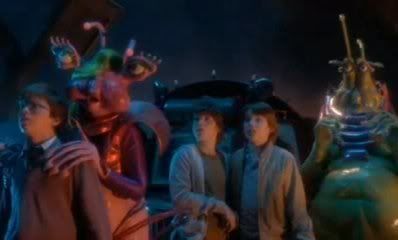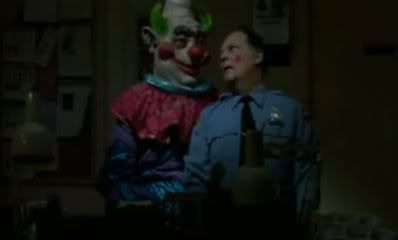
Joe Dante holds something of a rarefied place in film fandom since he's one of the dreamers who was able to break into the industry and put his own fantasies on the screen. He started out by writing reviews of genre films for fan magazines (which were later reprinted in Video Watchdog) and eventually got a job cutting trailers for Roger Corman's New World Pictures, which led to directing gigs like Hollywood Boulevard and Piranha. It was after he went out on his own to make The Howling that he was tapped by Steven Spielberg to direct one of the better segments of Twilight Zone: The Movie (the gonzo reimagining of "It's a Good Life") as well as Gremlins, which was such a major hit that it allowed him to develop a more personal project. That turned out to be 1985's Explorers, a feature-length wish-fulfillment fantasy for sci-fi geeks everywhere.
Best known today for marking the screen debuts of Ethan Hawke and River Phoenix, Explorers is mostly seen through the eyes of Hawke's pop-culture obsessive (obviously patterned after Dante), who gravitates to science fiction epics like War of the Worlds and This Island Earth, much like I was drawn to this film and watched it repeatedly when I was an impressionable young lad. Phoenix is much more down-to-earth, the rational proponent of science fact who is able to translate an image from Hawke's recurring flying dreams (which feature some Tron-like landscapes) into an actual circuit capable of creating a force field that he can control with his 128K Apple computer (an obvious hand-me-down from his computer-scientist father). To complete the trio they enlist gearhead Jason Presson, the product of a broken home who helps build and christen their spacecraft, the Thunder Road, which quite appropriately has a television screen as its main window. This is because when our three young explorers finally make it into space, they find that television has most emphatically preceded them.
Movies: January 2010 Archives

Lots of science-fiction and horror films have been built around seemingly ridiculous high-concept gimmicks, particularly when it comes to totally improbable and impractical monsters. We've had killer elevators, killer laundry-folding machines, killer tomatoes, killer beds, killer penises, etc. What makes Killer Klowns from Outer Space (1988) so special is that the movie fully makes good on the promise of its extravagant title. If you want a rollicking, highly enjoyable movie about murderous extraterrestrial harlequins, look no further.
The Chiodo Brothers -- director Steven and his siblings Charles and Edward -- have worked together and separately on a variety of film and television projects for the last 20 years or so, generally as creature designers, puppeteers, and art directors. (All three toiled on Team America: World Police.) Killer Klowns is the Brothers' one big chance to run amok in a feature-length film, and they do not waste this golden opportunity. The film feels like the kind of thing a group of brothers might come up with in giggly, late-night brainstorming sessions.
STEVEN: So our villains are evil alien clowns, right?
EDWARD: (snorting) Yeah, and maybe their spaceship looks like a big circus tent!
CHARLES: And their weapons are popcorn and balloon animals! (sprays Mountain Dew out his nose)
If the movie can be reduced to a formula, it would be: The Blob times Gremlins minus the actual monsters from those movies minus budget plus clowns plus terrible sweaters plus Dean Wormer from Animal House. That's a lot to absorb, so let me break it down.
Greetings, Unloosen reader(s), and welcome to what promises to be a bright, shining and -- for lack of a better term -- new decade. According to Arthur C. Clarke, 2010 is the Year We Make Contact, which raises the hope that this will be the year that Unloosen reaches a wider readership. To that end, Joe Blevins and I have chosen to set aside the more esoteric fare that we're known for (so to speak) and start reviewing movies people have actually seen. And so we have settled on the storied decade known as the '80s, one which is beloved by countless VH1 commentators and is known for any of a number of high-profile motion pictures. Just don't think we're doing this out of some misplaced sense of nostalgia. Sure, most of the films that we plan on writing about on a biweekly basis (starting this Thursday) are ones that one or both of us saw -- in some cases, multiple times -- during our misspent youths, but we intend to look at them afresh with critical eyes. Will Johnny Dangerously be as funny as I thought it was before I reached puberty? Do the special effects in Weird Science hold up after two and a half decades? And does one really need to sit through Ghandi more than once in a lifetime? Stay tuned to find out.
